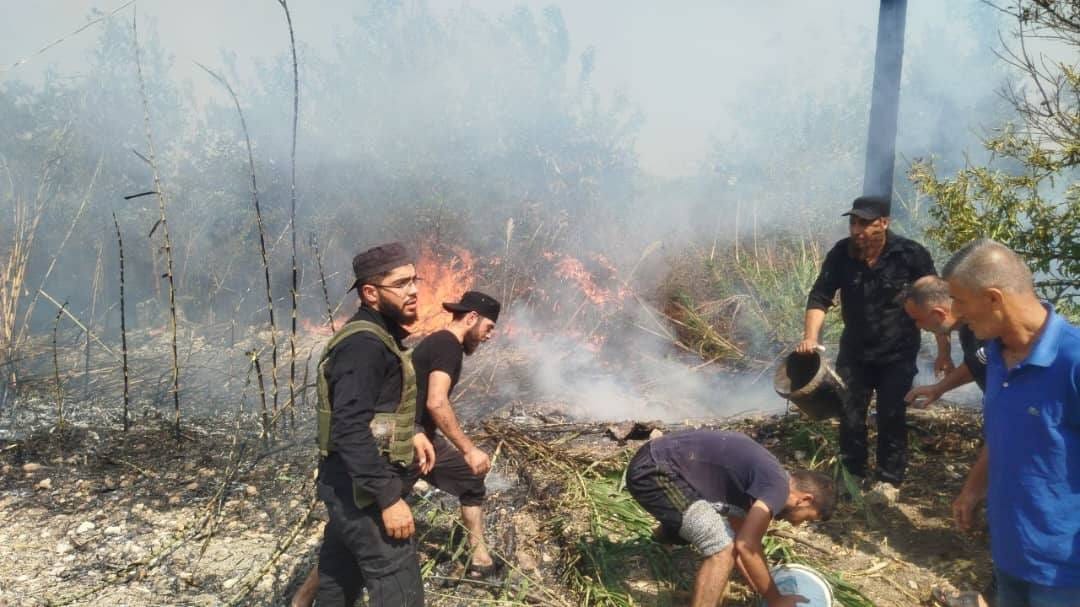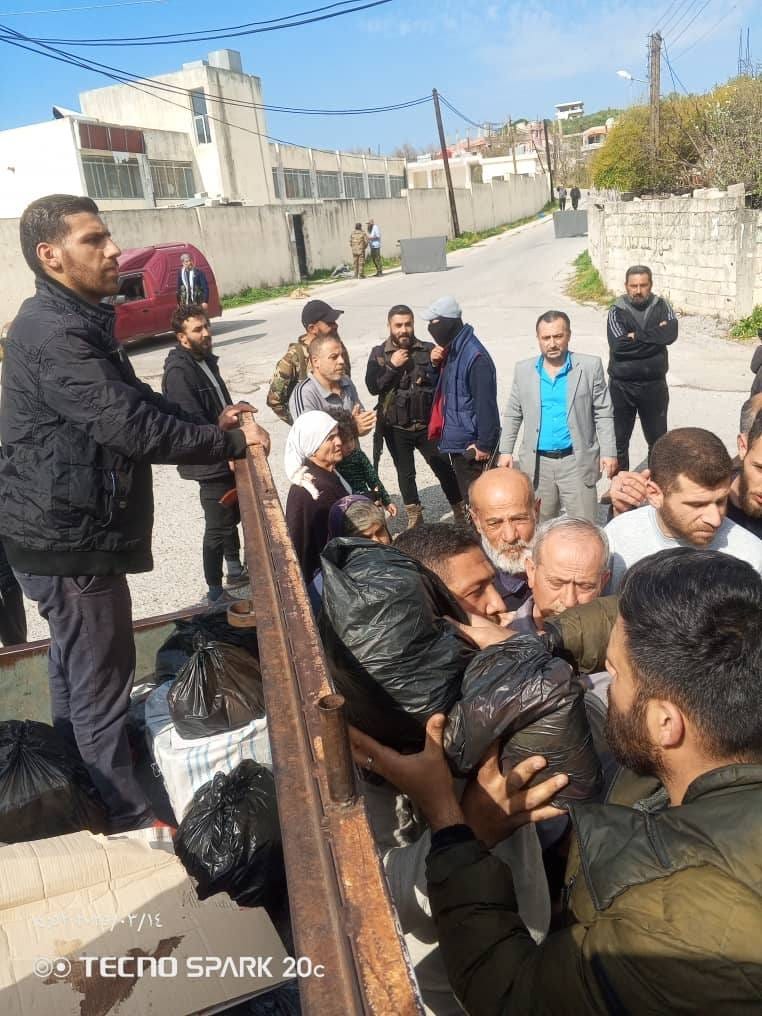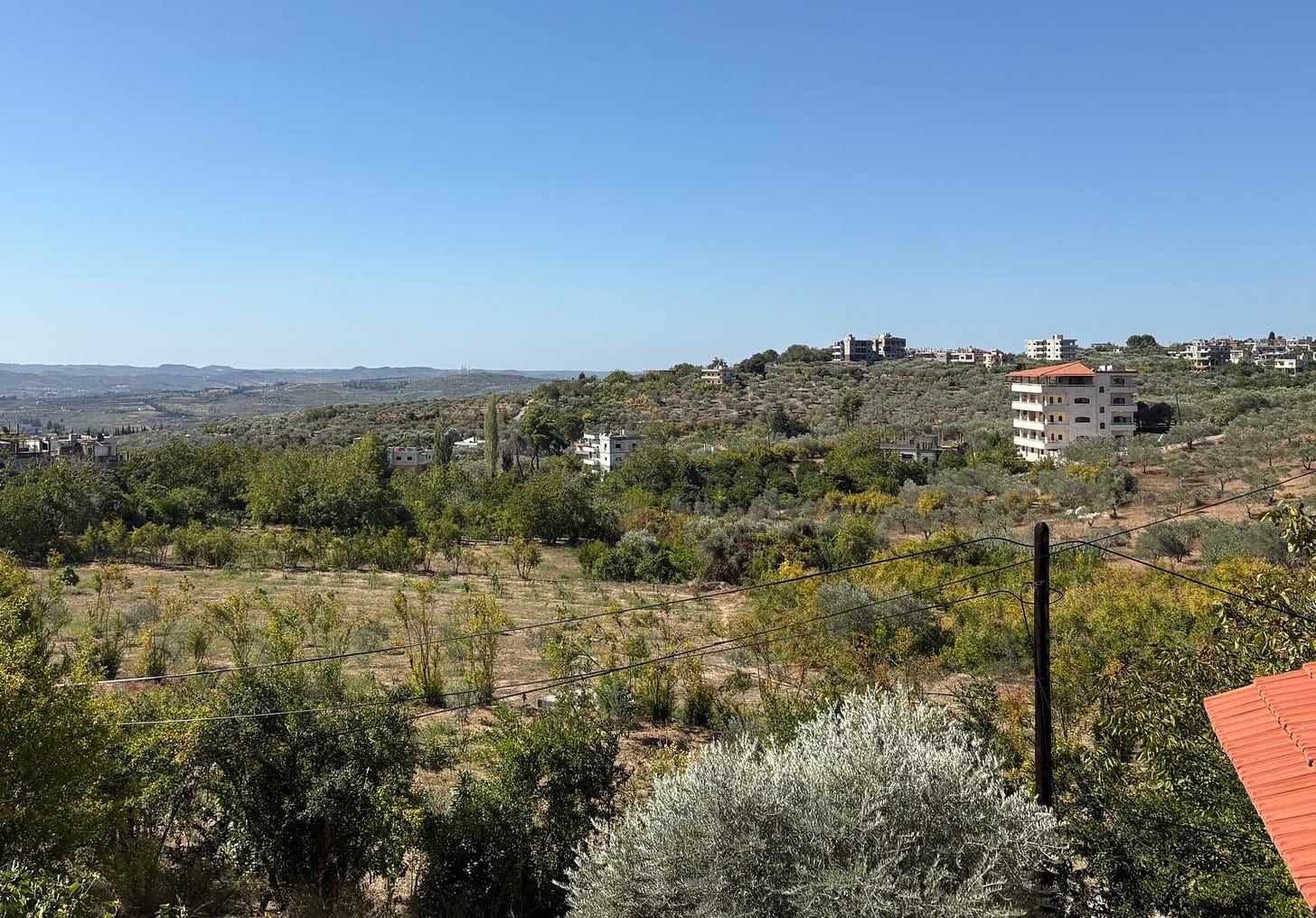One of the most basic questions about the March 6 coastal massacres that has gone unanswered is why some villages were attacked by pro-government forces and others were not. At the time, I had spoken with a local in a village in the western edge of the Bahluliyah subdistrict who described respectful, professional conduct by the 77th Brigade which protected his village from a pro-government faction which had entered and begun killing civilians. No other killings were reported in Bahluliyah during those four days of violence, and afterwards a local charity began delivering aid baskets to nearby affected villages with the help of Ministry of Defense and General Security forces.
I visited Bahluliyah earlier this week to understand what exactly has happened in this rural farming region since December 8, and what type of relationship the locals here have with the new government.
Widespread Poverty
Bahluliyah subdistrict sits between Latakia city and Haffeh, straddling the northern edge of the Alawi-dominated parts of central and southern Latakia province. It is a lush farming land set on rolling hills with the looming Jabal Akrad and Jabal Turkmen mountains to the north and the long spine of the north-south coastal mountain range to the east.
Despite its initial appearance, the area has been suffering from a major drought for several years. Wells are going dry and many of the area’s key crops are dying off. The drought is so bad that water has not just become scarce for agriculture, but also for households. This year, residents ventured into the mountains in search of new springs to tap into, but this water was rife with bacteria and diseases. The Red Crescent ultimately had to organize deliveries of medicine this summer to deal with the rise in water-borne illness in the villages.
This region is truly poor. I spent the day with a family of seven in the city of Bahluliyah. All bore the physical marks of life-long malnutrition. Like much of Latakia’s Alawi villages, most of the men here served in the regime’s army. The remaining jobs were in teaching or farm work. Like the rest of Latakia, the local economy here was never built to sustain the actual population. The collapse of the regime’s army has left thousands of men without work now. While there are some jobs to be found in nearby Latakia city, working there would require paying for transportation and food and lodging in the city, making it prohibitively expensive. Part time farm work remains the only real job, but the ongoing drought has limited these opportunities even further.
The area also suffers from a lack of education. Sending children to university is a huge burden on families – not only the costs of attending school but the lack of income those children could have provided if they stayed home. Many people therefore dropped out of school in order to work menial jobs to help their family, others went directly to the military. There is now a huge skills gap in the area and a desperate need for basic education and skill training workshops.
Building Trust
This was the situation Syria’s new government inherited when it overthrew Assad on December 8. In the first days after, soldiers from Hayat Tahrir al-Sham (HTS) arrived in the nearby village of Restin, followed shortly thereafter by members of the Interior Ministry’s General Security Forces. Damascus appointed a Security Official for the region, and later a District Director and Subdistrict Director to deal with administration and service issues.
According to locals, these men – especially the security official and directors, were extremely respectful and kind from onset. Many locals initially feared these unknown men, who for 15 years they had been told wanted to kill all Alawis. Yet within a month or two, says one youth Alawi man, they were completely comfortable with the local security forces. General Security members regularly engage with and reassure those ex-regime soldiers who had undergone the taswiya settlement in December, trying to keep them feeling safe so that they don’t feel forced into criminal or insurgent activity. These efforts have paid off, and while many still fear what they see happening elsewhere in the country online, they do not fear the local authorities.
This open and kind engagement by the security forces since December played a large role in encouraging the local Alawi community to engage back. One of the biggest problems leading up to March 6 was Alawi self-isolation from local authorities – either because those specific authorities were sectarian or closed off, or out of simple fear of the unknown. In Bahluliyah, the security official was able to foster an environment of respect and open dialogue that resulted in widespread engagement by the locals.
Only one security problem ever occurred. Sometime in the first three months after Assad’s fall, a soldier at the Restin base wanted to “do something”, as the family describes it, though it was such an insignificant event they don’t remember any more details. The local security official intervened, calling the military commander of Jableh, Sheikh Allah Deek, to assist. Deek came and transferred the soldier out of the region, and there have been no problems caused by security forces since.

“They Kept Their Promise”
The local government’s and security forces’ respectful conduct and the community leaders’ open engagement before March proved critical on March 6. Residents in Bahluliyah recalled hearing gunfire erupt in the countryside and continue for hours that night. Locals were terrified that they would be forced out of their homes, and so a group of respected elders called the nearby HTS and GSS leaders in Restin and asked them to protect the area. According to residents, the security officers told them not to worry and that they would be protected.
Local Alawi insurgents had attacked the security base, but here they were too weak to overrun the positions as happened across much of Latakia. Therefore, when other pro-government factions began to enter the area from the nearby highway, these local security forces were able to keep the factions out of Bahluliyah. Two Alawi men were killed by the factions on the outskirts of the villages, but the area was spared from the mass killings and looting seen elsewhere.
On March 8, police and GSS units deployed directly inside Bahluliyah, reactivating the police station for the first time since December. Locals in the town then began organizing aid baskets for some of the nearby affected villages like Mukhtariyah and Sharifa. This aid was delivered by a small local charity called Ahl al-Khair. General Security and local army units escorted these aid convoys and assisted in their deliveries for several weeks.

The local government’s protection of Bahluliyah that night has greatly increased the trust between everyone. As a result, security members now regularly spend time with the areas youth, make house visits to drink tea and check in on families, and have even provided some free water deliveries to households. When there are problems within the villages between locals, they prefer to go to the police station rather than their local mayors. The new District and Subdistrict Directors also work closely with their respective communities to try and address the economic and water crises. While their ability to make much meaningful impact remains limited, it is clear that people appreciate their genuine engagement in their daily lives.
Today, Bahluliyah remains a bright spot in local government-Alawi relations. The area’s history underscores the huge positive impacts that professional and respectful conduct by security officials, and reciprocal openness by locals, can have in reducing fears and preventing the larger security problems seen elsewhere. Still, like much of northern Latakia, Bahluliyah is devasted by poverty and drought and desperately needs basic development projects which are so far nowhere in sight.



Very good piece, thank you. I wonder if the security forces also treated them better due to their poverty, VS the percieved wealth of some other alawite areas compared to the rest of the country.